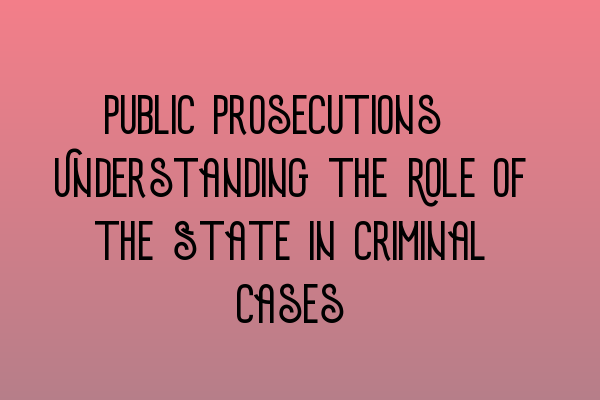Public Prosecutions: Understanding the Role of the State in Criminal Cases
In criminal cases, the role of the state in prosecuting offenders is crucial. Public prosecutions play a vital role in maintaining law and order, ensuring justice is served, and protecting society from criminal activities. Understanding how the state handles criminal cases can provide valuable insight into the legal system and the role of solicitors and lawyers in representing their clients.
The Role of Public Prosecutions
Public prosecutions, also known as Crown Prosecutions, refer to the legal process where the state takes on the responsibility of bringing criminal charges against individuals or organizations that have allegedly violated the law.
The primary objective of public prosecutions is to ensure that the guilty are held accountable for their actions, deter potential offenders, and maintain public confidence in the justice system.
By representing the state, public prosecutors aim to present a compelling case against the accused, gathering evidence, interviewing witnesses, and presenting arguments before the court. They work closely with law enforcement agencies to build a solid case and pursue justice on behalf of the community.
Bringing Criminal Charges
When a crime is committed, it is the responsibility of the state to investigate the matter, gather evidence, and determine whether there is sufficient evidence to support criminal charges. If the evidence is deemed substantial, a public prosecutor will initiate the legal proceedings against the accused.
It is important to note that the decision to bring criminal charges is not solely based on the actions of the state. The Crown Prosecution Service (CPS) is an independent body that operates in England and Wales and is responsible for assessing the evidence provided by the police and determining whether there is a realistic prospect of conviction. The CPS considers various factors such as the sufficiency of evidence, the public interest, and the likelihood of securing a conviction before proceeding with the charges.
Once the decision to prosecute is made, the state becomes the plaintiff, and the accused becomes the defendant. The case will then proceed to the court, where the prosecutor will present the evidence and arguments to prove the guilt of the accused beyond a reasonable doubt.
The Role of Solicitors and Lawyers
In criminal cases, both the state and the accused have the right to legal representation. Solicitors and lawyers play a crucial role in ensuring that their clients receive a fair trial and are adequately represented in court.
Expert legal representation is essential to navigate through the complexities of criminal law, understand the charges, gather evidence, and prepare a strong defense strategy. Solicitors work closely with their clients to gather all relevant information, interview witnesses, and build a compelling case to challenge the prosecution’s evidence.
If you or your organization are facing criminal charges, it is crucial to seek legal advice and representation from experienced criminal solicitors. They can guide you through the legal process, protect your rights, and work towards achieving the best possible outcome for your case.
Conclusion
Understanding the role of public prosecutions in criminal cases is crucial to grasp the functioning of the justice system. The state takes on the responsibility of prosecuting offenders to ensure that justice is served and society is protected. Solicitors and lawyers play an essential role in representing their clients’ interests and ensuring fair trials.
If you require expert legal representation in criminal cases or seek guidance on legal matters, contact SQE Criminal Law & Practice Law UK. Our team of experienced solicitors can provide you with the necessary knowledge and expertise to navigate through the complexities of the legal system.
Related Articles:
- Legal Representation for Delaware LLCs in the UK: Expert Advice
- SQE Exam Prep: Essential Study Materials for Aspiring Solicitors
- Expert Testimonies in UK Courts: Building Strong Cases
- Demystifying the Solicitors Qualifying Examination Format
- SQE Exam for International Lawyers: Challenges and Success Strategies
